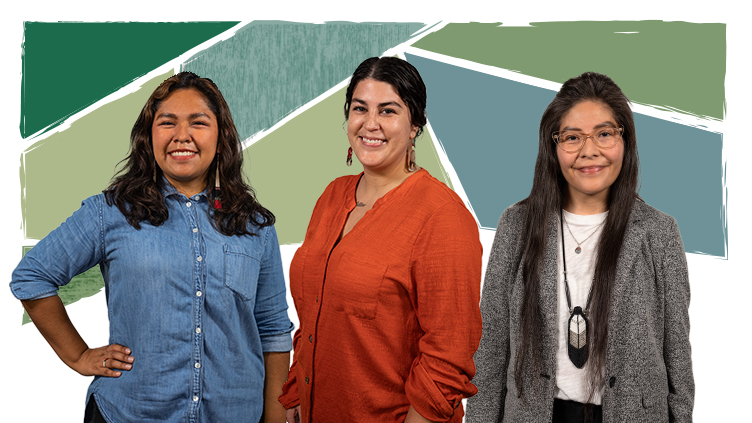
First-year MSW student Octavia Bartmess came to WashU at a time when her career and life were changing. She moved to St. Louis with family, including her three children, ages 8, 10 and 13, and stepped back from a decade-long career as a software engineer before the pandemic. This presented an opportunity for her to not only change the course of her career trajectory, but to also explore and connect with her Indigenous identity as a WashU Buder Scholar.
“I do think that the program [at the Buder Center for American Indian Studies] has allowed me to grow and better understand my own identity,” said Bartmess whose concentration is in American Indian/Alaskan Native studies. “This offers an opportunity for Indigenous people to come together, to make space to explore what it means to be Native, and to listen to the experiences of other Indigenous people.”
This offers an opportunity for Indigenous people to come together, to make space to explore what it means to be Native, and to listen to the experiences of other Indigenous people.
Although she grew up in Albuquerque, N.M. with a Diné mother and a Spanish-American father, Bartmess, like other Indigenous students at WashU, said that she grew up with her Diné culture adjacent to her.
“As a child, we visited my Diné family, but it wasn’t totally part of my upbringing,” said Bartmess. “I didn’t participate in Diné rituals, and I wasn’t taught certain things because my mom was still trying to find her own way with her culture. Now I am an older student trying to go back into the community and learn things for myself.”
Like Bartmess, Victoria Meza, also a first-year MSW student with a concentration in American Indian/Alaskan Native studies, said that WashU’s Buder Center is giving her a place to more fully explore what it means to be Navajo and Assiniboine Sioux. Meza, who grew up in Kamas, Utah said that living in urban areas has impacted her family’s ability to immerse themselves in their Native culture, and by extension, their Native communities. Because of that, she has struggled with her identity and what it means to be Native American.
“Because I didn’t grow up on a reservation or know the language or cultural practices, I felt like I didn’t necessarily have permission to own that Native side of me, but it’s becoming more of a conversation about how to support Native people who live in urban areas, because now, there are more Native folks living in urban settings than on reservations,” said Meza.
Because I didn’t grow up on a reservation or know the language or cultural practices, I felt like I didn’t necessarily have permission to own that Native side of me, but it’s becoming more of a conversation about how to support Native people who live in urban areas, because now, there are more Native folks living in urban settings than on reservations.
Ashlyn Newcomb, a second-year MSW student concentrating in American Indian/Alaskan Native studies, said that like her peers, she too has experienced the challenges of what she refers to as living in two different worlds. Even though her tribe – the Cherokee Nation of Oklahoma – has a strong government, language program, and cultural holidays and ceremonies to nurture a sense of belonging, being a Native person can be lonely.
“I feel that WashU tries to make Native students feel supported and heard,” Newcomb said. “But living in two worlds is a difficult task that all Native students struggle with. We made the choice to come here to better our communities, but it can be a very lonely process. We need more Native students at WashU. As Native students, we feel marginalized even more because there aren’t a lot of us on campus.”
Newcomb mentioned that she is often mistaken for Hispanic or even Middle Eastern when it comes to her ethnic heritage and race, and that even as a child, her family worried when she decided to attend a tribal college, Haskell Indian Nations University in Lawrence, Kan.
“They were worried I wasn’t Native passing enough to attend, and might struggle because I am too white passing,” said Newcomb. “There’s this ever-present tension in Native identity where you’re too Native for one group, and not Native enough for another, and that can create a lot of confusion and challenges.”
That is why for these three students, talking about and celebrating Native heritage is more important than ever.
Bartmess said that as she reflects on her Diné heritage and her upbringing, she now speaks more to her children about Indigenous philosophies and ways of knowing like the Four Directions and Seventh Generation Thinking.
“I am so grateful that our Diné culture still exists today and that I am here to help pass on traditions and values to my children said Bartmess,” Our people have survived eradication, removal, and forced assimilation; thus, I am here to witness contemporary Indigenous youth reclaim their culture. I wasn’t thinking and talking about this stuff when I was my kids’ age, not even with my Indigenous family. All of this, I learned much later in life, and it was something I had to look for.”
Each of the scholars came to WashU with similar hopes – to gain the knowledge and tools to help improve the Native American experience within the constructs of contemporary society.
“The biggest tool Natives can use to learn about their heritage is to know you can talk about it,” said Meza. “Even if you feel like an outsider, learn about that heritage. It’s scary at first, but there’s no other way to get to know your heritage. Show up. Ask questions. Help us grow as a community and celebrate who we are.”